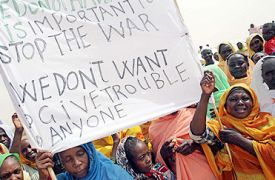Darfur displaced complain of international indifference
May 31, May (KHARTOUM) – Darfur Internally Displaced Persons (IDPs) on Sunday complained about the negligence of the international community to address their problem, adding they have been forgotten by the US officials who recently visited the region.
 Darfur IDPs and refugees want a swift solution for their problem which has lasted since six years ago, said Hussein Abu Sharati, the spokesperson of the IDPs and refugees. He further added they noted the lack of serious steps by the international community despite the deteriorating humanitarian situation.
Darfur IDPs and refugees want a swift solution for their problem which has lasted since six years ago, said Hussein Abu Sharati, the spokesperson of the IDPs and refugees. He further added they noted the lack of serious steps by the international community despite the deteriorating humanitarian situation.
The UN officials responsible for the humanitarian operations have said some 2.7 million people have been displaced by the violence in the region of western Sudan, where rebel forces have been battling government troops and the government-backed militias for more than six years. More than 300,000 people have been killed.
Abu Sharati further said that US officials who visited the region recently did not visit the camps to assess the humanitarian situation there nor to meet the IDPs. “The IDPs ask the US envoy to Sudan and other officials to visit them and to listen to their demands. Because the objective of these visits is to assess the humanitarian situation which is worsening day-after-day since the eviction of the 13 main international aid groups from the region.”
“They are not tourists,” he further added.
US Special Envoy Scott Gration, Senator John Kerry and Senators Isakson and Bob Corker visited the region and some IDPs camps selected by Sudanese officials.
Abu Sharati said the people they met as IDPs representatives are pro-government people who are fake IDPs.
The Sudanese government said it has covered successfully the gaps left by the forced departure of the international aid workers. US officials who visited the region say Sudan agreed to receive other international NGOs, but there are no visible changes on the ground.
The UN World Food Programme intensified the direct distribution to the IDPs. UNICEF and WHO also are doing there best to prevent the deterioration of the health situation.
The IDPs spokesperson said the security situation remains volatile and government militias continue to be located beside the displaced camps and in the villages deserted by the IDPs following the 2003-2004 attacks. He also dismissed government claims about the amelioration of the security situation and the voluntary return of the IDPs.
He underlined that the displaced are angered by the government’s policy of favouritism toward the Arab tribes while continuing to neglect the Darfuri who are deprived from security, health, and food.
He said such practices increasingly would trigger and aggravate the feeling of injustice.
“If the international community continues to not listen to our plights and the government pursues oppression and does not give us our rights, I fear that people would think seriously to struggle for the independence of the region,” he commented.
Abu Sharati, who said that some 1800 delegates met recently to discuss possible ways to end the conflict, addressed a message to the Sudan Liberation Movement’s exiled leader, Abdel Wahid Al-Nur asking him to convince the international community to provide necessary security.
“If he fails or they do not act quickly enough, Al-Nur has to seek to defend his people by arms because we cannot continue indefinitely in this situation,” said Abu Sharati.
Al-Nur, who met two days ago with the US envoy Gration in Paris, refuses to take part in a peace process to end the ongoing conflict in Darfur. He says the IDPs and refugees do not want to him to discuss peace unless Khartoum disarms the government militias.
The rebel leader says they do not trust the government which might sign a peace deal with them but then would not implement it. For them, disarming the militias before talks is the only way to get what they want.
The IDPs in the past demonstrated their support for the rebel leader, who is asked by many countries to negotiate with Khartoum.
(ST)
